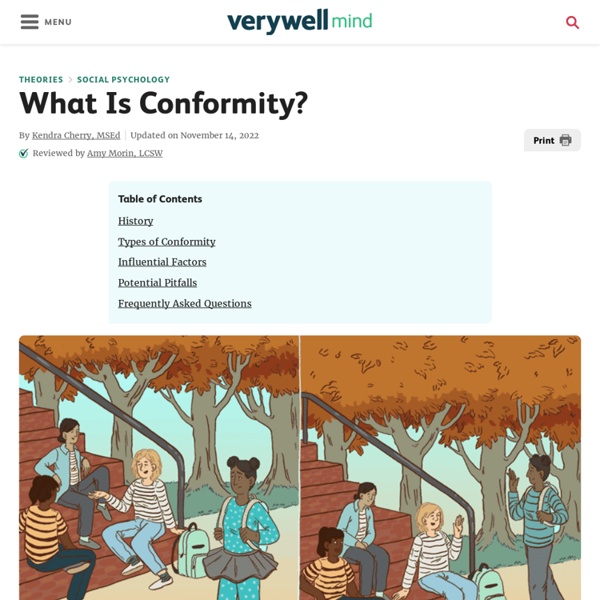What is Conformity?
What is Conformity? By Saul McLeod, updated 2016 Conformity is a type of social influence involving a change in belief or behavior in order to fit in with a group.
Attribution Theory - Situational vs Dispositional
Attribution Theory By Saul McLeod, published 2012 Attribution theory is concerned with how ordinary people explain the causes of behavior and events. For example, is someone angry because they are bad-tempered or because something bad happened? A formal definition is provided by Fiske and Taylor (1991, p. 23):
Situational Factors In Conformity
Conformity to the group is a complex phenomenon, which should be differentiated into several distinct psychological processes, and has often been contrasted with nonconformity or independence. This chapter describes the various aspects of conformity, public compliance and private change, conditions of responding, characteristics of the group, and nature of the task. Nonconformity consists of two conceptually distinct types of behavior, and may reflect independence, or it may actually be anticonformity.
Social Psychology and Influences on Behavior
What you’ll learn to do: recognize aspects of social psychology, including the fundamental attribution error, biases, social roles, and social norms, in your daily life Social psychology is the study of how people affect one another’s thoughts, feelings, and behaviors. In this section, you’ll learn about how our attitudes about others and our perception of our self can be deceiving. You’ll examine situational forces that have a strong influence on human behavior including social roles, social norms, and scripts. You’ll learn about how humans use the social environment as a source of information, or cues, on how to behave. Situational influences on our behavior have important consequences, such as whether we will help a stranger in an emergency or how we would behave in an unfamiliar environment.
Social Influence Revision Notes
Social influence is the process by which an individual’s attitudes, beliefs or behavior are modified by the presence or action of others. Four areas of social influence are conformity, compliance and obedience, and minority influence. Conformity / Majority Influence Conformity is a type of social influence defined as a change in belief or behavior in response to real or imagined social pressure. It is also known as majority influence. Compliance AO1
Conformity - Determinants Of Personality, Experiment, and Subjects - JRank Articles
Adaptation of one's behavior or beliefs to match those of the other members of a group. Conformity describes the adaptation of behavior that occurs in response to unspoken group pressure. It differs from compliance, which is adaptation of behavior resulting from overt pressure. Individuals conform to or comply with group behavior in an attempt to "fit in" or to follow the norms of the social group.
Attribution (psychology)
The process by which individuals explain the causes of behavior and events Ex. A child attributes their feelings to the weather outside their house; it is raining outside, because it is raining outside the child feels sad. Ex. A child attributes the weather to their feelings; the child is feeling sad, because the child is feeling sad it is raining outside.
Asch Conformity Experiment
Solomon Asch - Conformity Experiment By Saul McLeod, updated Dec 28, 2018 Solomon Asch conducted an experiment to investigate the extent to which social pressure from a majority group could affect a person to conform.
Boundless Psychology
Group Behavior Groups influence individual decision-making processes in a variety of ways, such as groupthink, groupshift, and deindividuation. Learning Objectives Give examples of groupthink, groupshift, and deindividuation Key Takeaways Key Points
Person, Gender, and Cultural Differences in Conformity – Principles of Social Psychology – 1st International Edition
Summarize the social psychological literature concerning differences in conformity between men and women.Review research concerning the relationship between culture and conformity.Explain the concept of psychological reactance and describe how and when it might occur. Although we have focused to this point on the situational determinants of conformity, such as the number of people in the majority and their unanimity, we have not yet considered the question of which people are likely to conform and which people are not. In this section, we will consider how personality variables, gender, and culture influence conformity.



